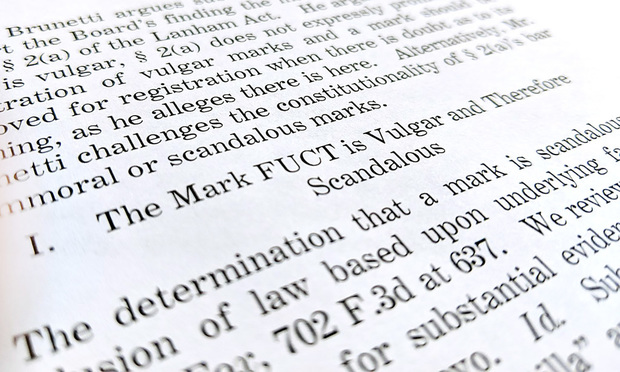'Scandalous' Trademarks Like 'FUCT' Are Allowed, Divided US Supreme Court Says
Justice Sonia Sotomayor said in a partial dissent: “The court's decision today will beget unfortunate results."
June 24, 2019 at 10:30 AM
4 minute read
The original version of this story was published on National Law Journal
 The U.S. solicitor general's petition in a trademark dispute over the mark “FUCT.”
The U.S. solicitor general's petition in a trademark dispute over the mark “FUCT.”
A divided U.S. Supreme Court on Monday said the First Amendment prohibits the U.S. government from denying intellectual property protection to “immoral” or “scandalous” trademarks, such as the name of the clothing line “FUCT” that was in the case before the justices.
Ruling in Iancu v. Brunetti, the justices said the Lanham Act, which bans registration of “immoral … or scandalous matter,” violates the free speech rights of clothing designer Erik Brunetti.
“There are a great many immoral and scandalous ideas in the world (even more than there are swearwords), and the Lanham Act covers them all. It therefore violates the First Amendment,” Justice Elena Kagan wrote for the 6-3 majority.
The court's decision followed the court's trend of ruling in favor of free speech. Just two years ago, in Matal v. Tam, the court ruled that disparaging marks could not be denied registration under the Lanham Act.
Chief Justice John Roberts Jr. dissented in part, asserting that “standing alone, the term 'scandalous' need not be understood to reach marks that offend because of the ideas they convey; it can be read more narrowly to bar only marks that offend because of their mode of expression—marks that are obscene, vulgar, or profane.”
Justice Stephen Breyer joined Roberts and also joined a partial dissent by Justice Sonia Sotomayor.
Sotomayor wrote, “The court's decision today will beget unfortunate results. … The government will have no statutory basis to refuse (and thus no choice but to begin) registering marks containing the most vulgar, profane, or obscene words and images imaginable.”
The Brunetti case drew many briefs in which words that were even more explicit than FUCT were mentioned, but the words were avoided during oral argument.
To prove the inconsistent handling of similar trademarks, Brunetti's counsel of record John Sommer listed 34 words that might sound scandalous. Words like FCUK, FWORD, and WTF IS UP WITH MY LOVE LIFE? have been granted trademarks.
But in his brief, Sommer dropped an unusual footnote that reassured the justices they wouldn't have to hear the words he wrote about. “It is not expected that it will be necessary to refer to vulgar terms during argument,” Sommer wrote. “If it should be necessary, the discussion will be purely clinical, analogous to when medical terms are discussed.”
During oral argument April 15, Deputy Solicitor General Malcolm Stewart, who was defending the constitutionality of rejecting Brunetti's trademark, found a creative way of describing the word without saying it. “This mark,” Stewart said to the justices, “would be perceived by a substantial segment of the public as the equivalent of the profane past participle form of a well-known word of profanity and perhaps the paradigmatic word of profanity in our language.”
Roberts who has two teenage children old enough to have heard if not spoken expletives, sympathized with the plight of “parents who are trying to teach their children not to use those kinds of words” who might see people wearing FUCT clothing while walking with their children in a shopping mall.
The court's ruling is posted below:
[falcon-embed src="embed_1"]
Read more:
Justices and Lawyers Sidestep Profanity in 'Scandalous' Trademark Case
Supreme Court to Review Patent Office Ban on Vulgar Trademarks
In Quoting Profanity, Some Judges Give a F#%&. Others Don't
Marcia Coyle contributed reporting from Washington.
This content has been archived. It is available through our partners, LexisNexis® and Bloomberg Law.
To view this content, please continue to their sites.
Not a Lexis Subscriber?
Subscribe Now
Not a Bloomberg Law Subscriber?
Subscribe Now
NOT FOR REPRINT
© 2025 ALM Global, LLC, All Rights Reserved. Request academic re-use from www.copyright.com. All other uses, submit a request to [email protected]. For more information visit Asset & Logo Licensing.
You Might Like
View All
Litigators of the Week: 3 Former SGs Team Up In a Major Opioid Win for Pharmacies at the Ohio Supreme Court

'The Most Peculiar Federal Court in the Country' Comes to Berkeley Law

Litigators of the Week: The Eighth Circuit Knocks Out a $564M Verdict Against BMO in Ponzi Case

Litigator of the Week: Reversing a $2B Trade Secret Verdict, the Largest in Va. History
Trending Stories
- 1‘The Decision Will Help Others’: NJ Supreme Court Reverses Appellate Div. in OPRA Claim Over Body-Worn Camera Footage
- 2MoFo Associate Sees a Familiar Face During Her First Appellate Argument: Justice Breyer
- 3Antitrust in Trump 2.0: Expect Gap Filling from State Attorneys General
- 4People in the News—Jan. 22, 2025—Knox McLaughlin, Saxton & Stump
- 5How I Made Office Managing Partner: 'Be Open to Opportunities, Ready to Seize Them When They Arise,' Says Lara Shortz of Michelman & Robinson
Who Got The Work
J. Brugh Lower of Gibbons has entered an appearance for industrial equipment supplier Devco Corporation in a pending trademark infringement lawsuit. The suit, accusing the defendant of selling knock-off Graco products, was filed Dec. 18 in New Jersey District Court by Rivkin Radler on behalf of Graco Inc. and Graco Minnesota. The case, assigned to U.S. District Judge Zahid N. Quraishi, is 3:24-cv-11294, Graco Inc. et al v. Devco Corporation.
Who Got The Work
Rebecca Maller-Stein and Kent A. Yalowitz of Arnold & Porter Kaye Scholer have entered their appearances for Hanaco Venture Capital and its executives, Lior Prosor and David Frankel, in a pending securities lawsuit. The action, filed on Dec. 24 in New York Southern District Court by Zell, Aron & Co. on behalf of Goldeneye Advisors, accuses the defendants of negligently and fraudulently managing the plaintiff's $1 million investment. The case, assigned to U.S. District Judge Vernon S. Broderick, is 1:24-cv-09918, Goldeneye Advisors, LLC v. Hanaco Venture Capital, Ltd. et al.
Who Got The Work
Attorneys from A&O Shearman has stepped in as defense counsel for Toronto-Dominion Bank and other defendants in a pending securities class action. The suit, filed Dec. 11 in New York Southern District Court by Bleichmar Fonti & Auld, accuses the defendants of concealing the bank's 'pervasive' deficiencies in regards to its compliance with the Bank Secrecy Act and the quality of its anti-money laundering controls. The case, assigned to U.S. District Judge Arun Subramanian, is 1:24-cv-09445, Gonzalez v. The Toronto-Dominion Bank et al.
Who Got The Work
Crown Castle International, a Pennsylvania company providing shared communications infrastructure, has turned to Luke D. Wolf of Gordon Rees Scully Mansukhani to fend off a pending breach-of-contract lawsuit. The court action, filed Nov. 25 in Michigan Eastern District Court by Hooper Hathaway PC on behalf of The Town Residences LLC, accuses Crown Castle of failing to transfer approximately $30,000 in utility payments from T-Mobile in breach of a roof-top lease and assignment agreement. The case, assigned to U.S. District Judge Susan K. Declercq, is 2:24-cv-13131, The Town Residences LLC v. T-Mobile US, Inc. et al.
Who Got The Work
Wilfred P. Coronato and Daniel M. Schwartz of McCarter & English have stepped in as defense counsel to Electrolux Home Products Inc. in a pending product liability lawsuit. The court action, filed Nov. 26 in New York Eastern District Court by Poulos Lopiccolo PC and Nagel Rice LLP on behalf of David Stern, alleges that the defendant's refrigerators’ drawers and shelving repeatedly break and fall apart within months after purchase. The case, assigned to U.S. District Judge Joan M. Azrack, is 2:24-cv-08204, Stern v. Electrolux Home Products, Inc.
Featured Firms
Law Offices of Gary Martin Hays & Associates, P.C.
(470) 294-1674
Law Offices of Mark E. Salomone
(857) 444-6468
Smith & Hassler
(713) 739-1250






